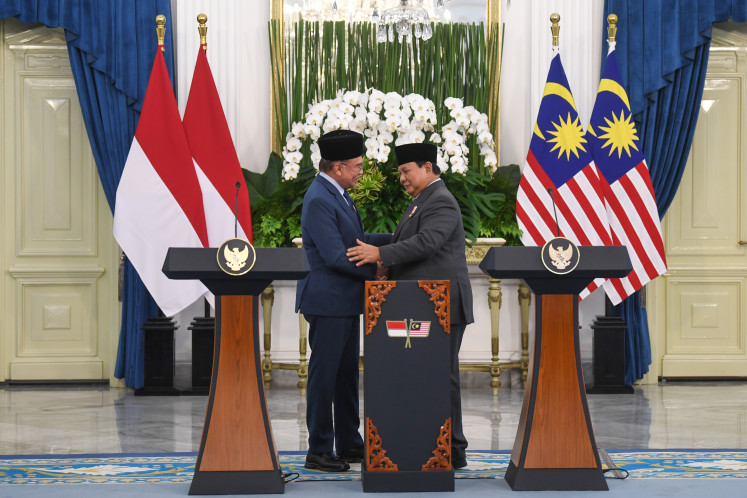Popular Reads
Top Results
Can't find what you're looking for?
View all search resultsPopular Reads
Top Results
Can't find what you're looking for?
View all search resultsTeachers use games to revive Balinese
The Taensiat Banjar (customary neighborhood organization) community hall in West Denpasar was filled with joyous laughter on Saturday morning
Change text size
Gift Premium Articles
to Anyone

T
he Taensiat Banjar (customary neighborhood organization) community hall in West Denpasar was filled with joyous laughter on Saturday morning.
The adjacent road was severely congested as motorists careened their necks to get a glimpse on what was causing the boisterous merriment inside.
Balinese traditional songs and supporting yells seized the spectators' attention.
Inside the hall, 200 teachers from kindergartens across Denpasar locked in a tight but lighthearted competition to create dolanan (traditional children's games).
The teachers were divided into 26 groups and given the task of formulating new scenarios for several popular traditional children's games.
Each group was then required to perform their creation before their fellow teachers. The whole process was conducted in Balinese.
Organized by the Denpasar branch of the Association of Kindergarten Principals, the competition is part of a program to devise more engaging ways to teach the Balinese language to young pupils.
As children in Denpasar are increasingly succumbing to modern forms of entertainment, delivered in Indonesian and English, their familiarity with their supposed mother tongue is gradually decreasing.
Nowadays, most families in Denpasar use Indonesian as their primary language at home. It has become rare for parents to converse with their children in Balinese, let alone find anyone who is still adept in the refined forms of the language.
"Parents now prefer their children using Indonesian in daily life because the language carries an image of modernness and, somehow, implies that the speakers are of higher social status than the ones using Balinese," association chairwoman, IA Ketut Suastini, said.
"Our biggest challenge is how to create a teaching approach that the students will find attractive."
Delivering teaching materials through traditional games is one of the most viable approaches considered by the association.
Made Taro, arguably the most passionate and prominent defender of Balinese traditional games, shared similar views.
"The current teaching approach to Balinese lacks interactivity, those fun elements that engage students to play an active role in acquiring the knowledge," he said.
"No wonder Balinese has become a boring subject for the students."
Taro has run an informal school that teaches traditional games to children for decades. He has also authored several books on the subject.
He agreed that traditional games offer an attractive way to educate. However, he warned that such an approach should not be implemented in a fragmented, short-term way.
"Traditional games are good because they will provide the students with an opportunity to learn and have a lot of fun at the same time. Yet, this approach must be done continuously," he said.
The traditional games brought smiles not only to the children's faces, but also to the adults.
When two groups of teachers performed the layangan (kite) game on the stage, the community hall was instantly transformed into a playground. The children giggled in unison as their kites danced in the air and screamed toward each other when they tried to sever the string of their opponents' kites.
Similar "childish" behaviour was also displayed during a makabakan performance, a traditional game that uses small, disc-shaped stones, or coins. The groups took turns in placing their stones on the ground, ready for their opponents to throw stones from a distance, with the aim of striking the stones on the ground.
When the winning group claimed its prize - a piggy back ride courtesy of their opponents - the whole hall, not to mention the road-side spectators, erupted in infectious laughter.
The competition was not the only event in the association's program to revive the everyday use of Balinese.
Previously, the association had recommended the establishment of "Balinese Language Day" in 205 kindergartens across Denpasar.









